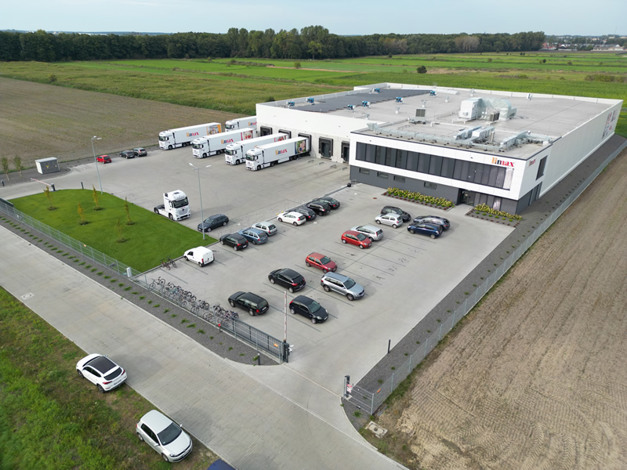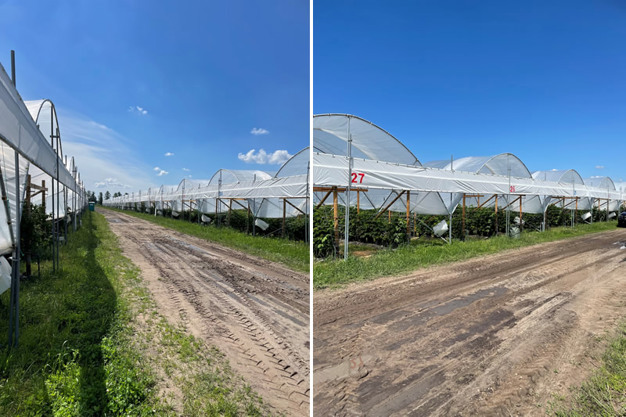More than 20 years ago, Limax established itself in the West Polish city of Wolsztyn. "Back then, Poland was a booming mushroom-producing country for the fresh market. We started as a purchasing company for Limax Netherlands but soon started looking to expand in Northern Europe. Besides the local market, we now mainly supply customers in Germany, Denmark, Norway, the Czech Republic, Sweden, Finland, and the Baltic States," begins General Manager Leo Klaassen, who has lived and worked in Poland since 1996.
Developments in that country followed in rapid succession. In 2004, it was strategically decided to start Limax Substrates in Poland. It now produces 1,000 tons of high-quality mature compost weekly for the European fresh market. In 2007 - at a client's request - the move into strawberry cultivation followed. "That was high on Scandinavian retailers' wish list, but they concluded that the quality and cultivation method didn't match the requirements then. We had land next to our compost business, so we started doing it ourselves."
Synergy benefits
Besides growing strawberries in tunnels, in 2009, the first land was bought for blueberry and raspberry cultivation. "We now have about 90 hectares of soft fruit under our own management and work closely with several like-minded raspberry, strawberry, and blueberry growers," says Leo.
"Outside of the Polish season, we buy soft fruit worldwide to serve our customers year-round." The general manager adds that that synergy benefits mushrooms and soft fruit cultivation. Distribution, for example, requires roughly the same conditions. "We can guarantee that we transport the products between 2 and 4°C," Leo states.
Limax's Polish operation's sales have also increased in recent years. "There's more demand for high-quality products than a few years ago. Yet, there is still much to be gained. For instance, an average Polish buyer hardly knows what a well-picked strawberry should look like in the Polish season, and prices are mostly decisive. With the imported product from, say, Dutch greenhouses, people expect the product to look good."
By growing its own produce, Limax is trying to set a standard in Poland, though, Leo admits, that is not always recognized. "Our demanding customers who will also pay good prices see that, but not other clients who aren't yet so familiar with the Polish product," he says.
"WIth them, Poland still has a slightly tarnished name. People are more willing to pay higher prices for Dutch strawberries, while I find our strawberries better than the average Dutch strawberry. In addition to Elsanta, we grow more and more through-bearers to supply strawberries from mid-May to the end of October."

New packaging center
Those services have increased since the inauguration of its new packaging center in 2022. "We have about six top-seal packing lines for mushrooms and soft fruit. More South American berry suppliers are now approaching us to, for example, package their fruit. We're on the Berlin - Poznań line and can quickly reach buyers' premises in, for instance, Sweden or Denmark. So, we're as good as the Dutch companies. We often use our own vehicles for the logistics," Klaassen says.
Limax is also increasingly introducing products like exotic fruit to the Polish market. "Poland is a large country which is sometimes logistically quite challenging. That's why you have to bundle product flows as much as possible. Poland has a big standard product market, but demand for more exclusive products is also steadily climbing."
"Polish people go on vacations further away, encountering more exotic products. That lets us distinguish ourselves towards local supermarkets. The import network we've built over the years helps us offer a year-round assortment. That's been by trial and error, but we're certainly not dissatisfied with it," Leo explains.
Consolidation
The Dutch mushroom sector has consolidated significantly in recent decades. Not so in Poland, says Leo. "Stricter regulations mean the particularly smaller Polish cultivation companies are finding it increasingly difficult. Many lack succession, and getting staff is also challenging here. The unemployment rate is very low. Plus, there's often an even lower drive to work in mushroom cultivation than strawberries."
"In the past, people were often still up to work weekends; nowadays, they increasingly stick to a maximum of 40 hours per week. In the past, the Dutch often relied on Polish workers; similarly, for the last eight years, we've worked mainly with pickers from Ukraine. Those people also often travel on to countries like Germany, the Netherlands, or Sweden where they can earn more than in Poland," Leo continues.
Limax does not bother with exclusive varieties. "There's often plenty of push on the grower side, but, in the end, the supermarkets aren't always keen. You can promise all kinds of things, but ultimately, the variety must be grown, harvested, packaged, and distributed in the same way everywhere."
"Climates and local conditions differ. The chain has many hurdles," Leo knows. Organic farming, too, is beyond the cultivation company's scope. "Cultivation-wise, you must take big steps while you get very little sales guarantee. Especially in countries like Sweden and Denmark, supermarket organizations will more likely prefer local organic products."

Growing raspberries in tunnels
More mixes
Limax Poland sells a considerable volume of mushrooms every week. "Most are white mushrooms, but the chestnut mushrooms range has grown over the years. We import exotic mushrooms from China, but those are complementary to our range and aren't our largest branch. What is increasing are the mixes of both mushrooms and fruit. We make quite a lot of those," Klaassen says. "For that, we are ideally located. Labor is still cheaper, which makes it easier to do things by hand."
"Products have become much pricier in Poland too. Who'd have thought Peru would have to deal with such a blueberry season? Spending patterns are being adjusted accordingly, but that will also recover at some point. We want to slightly expand the assortment and expand our buyer base in the surrounding countries. We'd rather have 20 smaller customers than be dependent on two huge ones," Leo concludes.
 For more information:
For more information:
Leo Klaassen
Limax Sp. z o.o.
90a Berzyna
64-200, Wolsztyn, PL
Tel: +48 601 808 985
Email: leo.klaassen@limax.pl
Website: www.limax.eu
